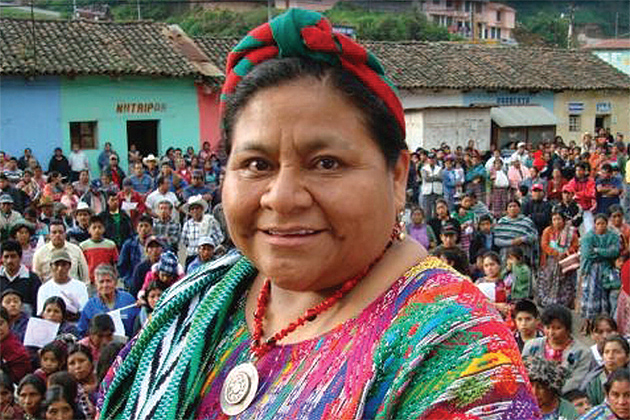
Rigoberta Menchú Tum, the first Indigenous woman and the youngest person ever to receive the Nobel Peace Prize, will deliver the UNESCO Chair & Institute of Comparative Human Rights Lecture at UConn on Tuesday, Sept. 11, at 4 p.m. in the Student Union Theatre.
This year marks the 20th anniversary of the awarding of the Nobel Peace Prize to Menchú Tum, who will discuss “Human Rights and Social Justice” in her address.
Menchú has dedicated her life to publicizing the plight of Guatemala’s indigenous peoples during and after the 36-year Guatemalan Civil War, which ended in 1996, and to promoting indigenous rights not only in her native Guatemala but in the Western Hemisphere generally. Her work has earned her several international awards, including the UNESCO “Education for Peace” prize. In 2007, Menchú Tum was named a UNESCO Goodwill Ambassador.
Menchú Tum was born and raised in a Quiché Mayan Indian peasant family. In her early years she helped with the family farm work, both in the northern highlands where her family lived, and on the Pacific coast, where both adults and children went to pick coffee on the big plantations.
Menchú Tum soon became involved in social reform activities and became prominent in the women’s rights movement. Such reform work aroused considerable opposition in influential circles, especially after a guerilla organization established itself in the area. The Menchú family was accused of taking part in guerrilla activities and Rigoberta’s father, Vicente, was imprisoned and tortured for allegedly having participated in the execution of a local plantation owner. After his release, he joined the Committee of the Peasant Union (CUC).
In 1979, Rigoberta, too, joined the CUC. That year, her brother was arrested, tortured, and killed by the army. The following year, her father was killed when security forces in the capital stormed the Spanish Embassy, where he and some other peasants were staying. Shortly afterwards, her mother also died after being arrested, tortured, and raped.
Menchú Tum became increasingly active in the CUC, and taught herself Spanish as well as other Mayan languages in addition to her native Quiche. In 1980, she figured prominently in a strike the CUC organized for better conditions for farm workers on the Pacific coast, and on May 1, 1981, she was active in large demonstrations in the capital. She joined the radical 31st of January Popular Front, where she was involved in educating the Indian peasant population to resist military oppression.
In 1981, Menchú Tum had to go into hiding in Guatemala, and then flee to Mexico. That marked the beginning of a new phase in her life: as the organizer abroad of resistance to oppression in Guatemala and the struggle for Indian peasant peoples’ rights. In 1982, she was one of the founders of the joint opposition body, The United Representation of the Guatemalan Opposition (RUOG). In 1983, she told her life story to Elisabeth Burgos Debray. The resulting book, translated into English under the title, I, Rigoberta Menchú, attracted considerable international attention.
In 1986, she became a member of the National Coordinating Committee of the CUC, and the following year she was the narrator for a film called “When the Mountains Tremble,” about the struggles and sufferings of the Mayan people.
The United Nations Educational, Scientific and Cultural Organization (UNESCO) awarded the University of Connecticut the first UNESCO Chair in Human Rights in the U.S. in 2001. The Chair at UConn is part of a network of 52 UNESCO Chairs around the world that was founded in 1992 to promote human rights through education and research and to encourage collaboration among institutions of higher learning.
Menchú Tum’s address is co-sponsored by the African American Cultural Center, Asian American Cultural Center, Asian American Studies Institute, CLAS Dean’s Office, Department of History, El Instituto, Honors Program, Institute for African American Studies, Office of Global Affairs, Office of the Provost, Office of Student Services & Advocacy, Puerto Rican/Latin American Cultural Center, Rainbow Center, Residential Life, Women’s Center, and Women’s, Gender, and Sexuality Studies program.
The lecture is free and open to the public. Seating is limited and on a first-come basis. For more information, please visit www.unescochair.uconn.edu, or call 860-486-0647.


